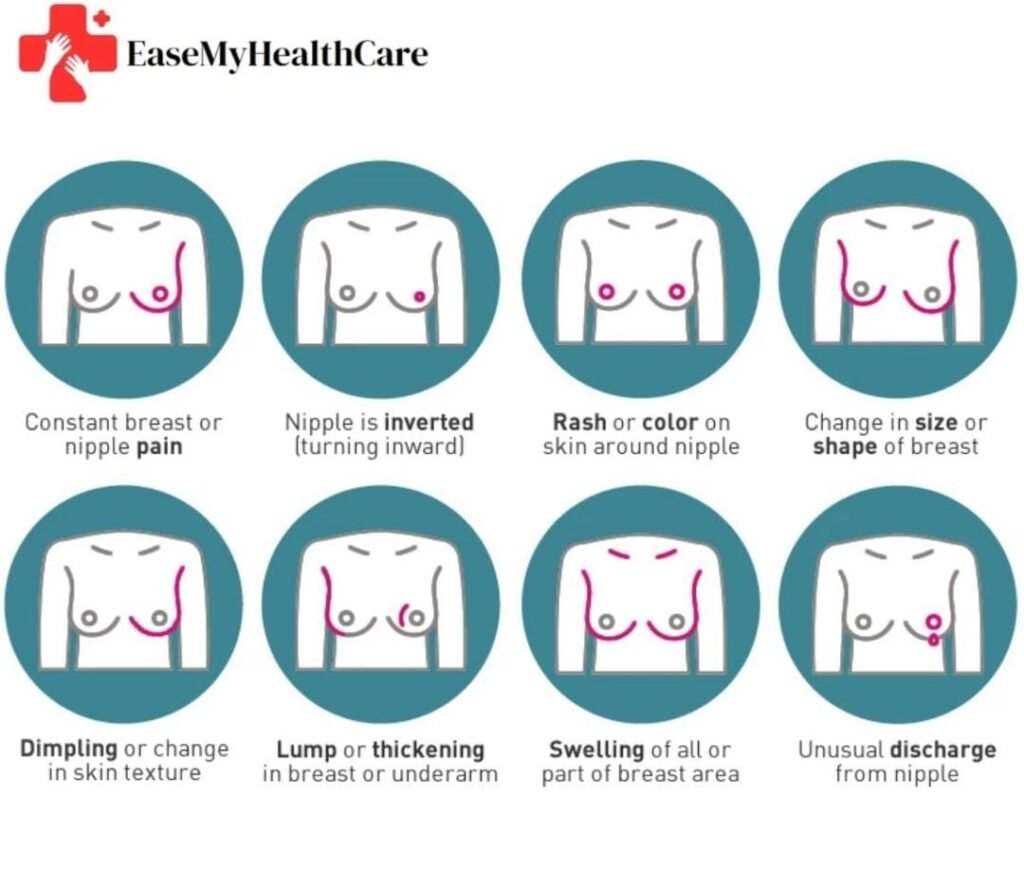Breast cancer is often associated with older women, but it can also affect young women under the age of 40. While less common, breast cancer in younger women poses unique challenges, including delayed diagnosis and differences in treatment options. This blog explores the causes, symptoms, and management of breast cancer in young women.
What is Breast Cancer in Young Women?
Breast cancer in young women refers to cases diagnosed in women below 40 years of age. Although it accounts for a smaller percentage of overall breast cancer cases, the impact is significant because younger patients often face more aggressive forms of the disease and unique emotional, physical, and social challenges.
Causes and Risk Factors
While the exact cause of breast cancer is not always clear, certain factors can increase the risk:
1. Genetic Mutations
- Mutations in the BRCA1 and BRCA2 genes significantly increase the risk of developing breast cancer at a younger age.
2. Family History
- A strong family history of breast or ovarian cancer can increase susceptibility.
3. Hormonal Factors
- Early onset of menstruation (before age 12) or late menopause can elevate risk due to prolonged exposure to estrogen.
4. Lifestyle Factors
- Obesity, smoking, and excessive alcohol consumption can contribute to higher risk.
5. Environmental Factors
- Exposure to radiation during adolescence or young adulthood may play a role.
Symptoms to Watch For
Young women should be vigilant about changes in their breasts. Common symptoms include:
- A lump or mass in the breast or underarm.
- Changes in breast size or shape.
- Skin changes, such as dimpling or redness.
- Nipple discharge or inversion.
- Persistent breast pain.

It’s important to note that not all lumps are cancerous, but any unusual changes should be evaluated by a healthcare provider.
Challenges in Diagnosis
Breast cancer in young women can often be overlooked due to:
- Lower awareness among younger individuals.
- Denser breast tissue, which makes mammograms less effective.
- Misattribution of symptoms to benign conditions like cysts or hormonal changes.
These factors contribute to delayed diagnoses, often leading to advanced-stage detection.
Treatment Options
The treatment approach for breast cancer in young women depends on the type, stage, and individual health conditions:
1. Surgery
- Lumpectomy: Removal of the tumor and surrounding tissue.
- Mastectomy: Removal of one or both breasts, depending on the extent of cancer.
2. Radiation Therapy
- Targets cancer cells left after surgery to prevent recurrence.
3. Chemotherapy
- Administered to destroy cancer cells or shrink tumors before surgery.
4. Targeted Therapy
- Focuses on specific molecules or pathways involved in cancer growth, such as HER2-positive breast cancer.
5. Hormone Therapy
- For hormone receptor-positive cancers, this treatment blocks the cancer’s ability to use hormones for growth.
Coping with Emotional and Social Challenges
A diagnosis of breast cancer at a young age can bring unique emotional and social challenges:
- Concerns about fertility and family planning.
- Body image issues after surgery or treatment.
- Anxiety and depression.
- Financial stress due to treatment costs and time off work.
Support groups, counseling, and open communication with loved ones can help manage these challenges effectively.
India: A Trusted Destination for Breast Cancer Treatment
India has emerged as a leading destination for medical tourism, offering advanced breast cancer treatment at affordable costs. Equipped with state-of-the-art facilities, skilled oncologists, and personalized care, India attracts patients from around the world.
Here are the top five private hospitals in India renowned for breast cancer treatment for international patients:
- Fortis Memorial Research Institute, Gurugram
- Apollo Hospitals, Chennai
- Medanta – The Medicity, Gurugram
- Max Super Speciality Hospital, New Delhi
- Narayana Health City, Bengaluru
EaseMyHealthcare collaborates with these and other top institutions to ensure that patients receive the best possible care.
Prevention and Early Detection
While breast cancer cannot always be prevented, certain measures can help reduce risk:
1. Regular Screenings
- Self-breast exams and routine clinical check-ups can help identify changes early.
2. Healthy Lifestyle
- Maintaining a healthy weight, exercising regularly, and avoiding smoking and excessive alcohol can lower risk.
3. Genetic Testing
- Women with a family history of breast cancer may benefit from genetic counseling and testing.
Conclusion: Stay Informed and Proactive
Breast cancer in young women is a growing concern, but early detection and effective treatment can improve outcomes significantly. Awareness, vigilance, and regular check-ups are key to combating this disease.
At EaseMyHealthcare, we provide resources and support for women facing breast cancer, including access to top oncologists and comprehensive treatment plans. Our partnerships with leading hospitals in India make it easier for patients to access world-class care at affordable costs.
If you have any inquiries, please reach out to us via email, phone or by submitting the form. We are committed to providing fast response, or visit our website and Get in touch with us.
Email us at
Info@easemyhealthcare.com
Contact No.
+91 9717729022
Learn more about our oncology services here: EaseMyHealthcare Oncology Services




